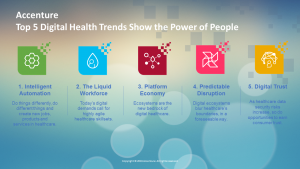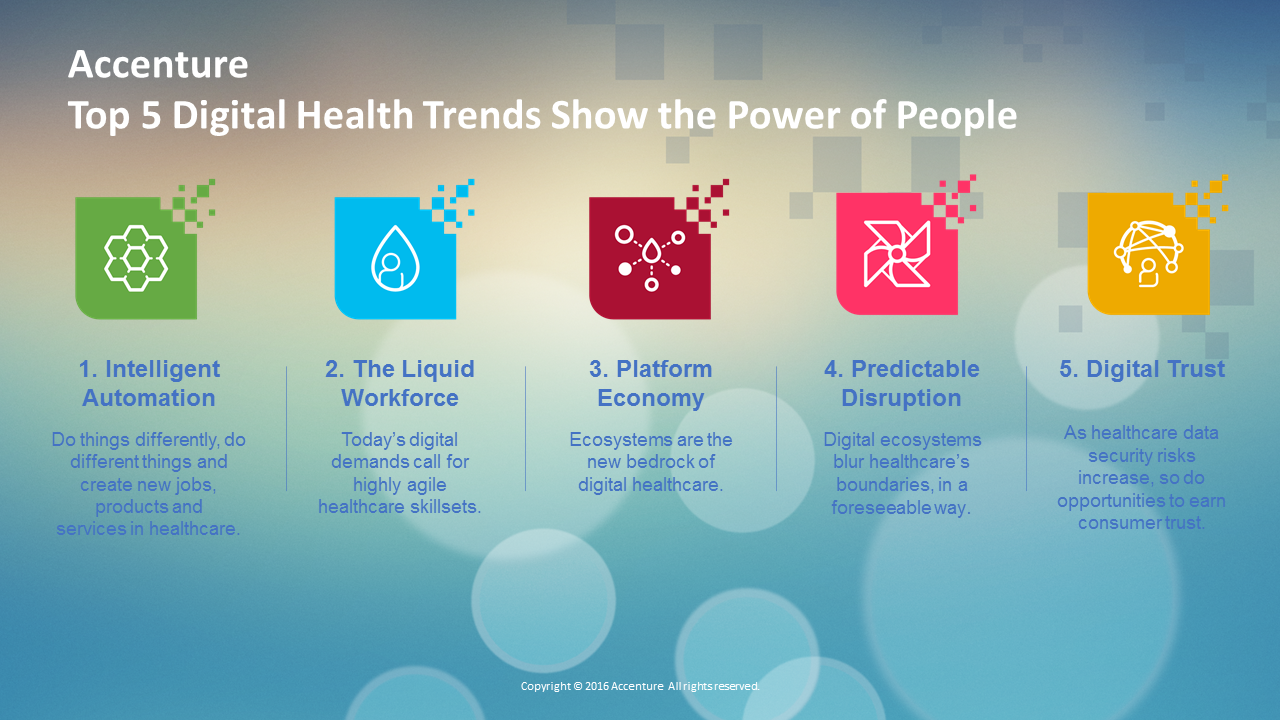 Digital platforms and tools are fast-advancing in all industries, and especially in health and health care. But it’s people-first, and digital PLUS analog, based on Accenture’s latest forecast of five macro technology trends.
Digital platforms and tools are fast-advancing in all industries, and especially in health and health care. But it’s people-first, and digital PLUS analog, based on Accenture’s latest forecast of five macro technology trends.
The five forces are:
- Intelligent automation – 70% of health executives expect to invest more in artificial intelligence;
- Liquid workforce – 42% of health/care workers are expected to be contractors or free agents within organizations within 3 years’
- Platform economy – 10x growth is expected in application programming interfaces (APIs) in the next five years, which will enable data to liquidly move across healthcare platforms
- Predictable disruption – 86% of healthcare executives believe they must reinvent their organizations ASAP before they get disrupted out of business by new entrants and competitors
- Digital trust – 65% of consumers globally believe that the benefits of digitally accessing their personal medical information outweighs the risk of privacy breaches.
In health and healthcare, these forces can overlap and combine: for example, platforms combined with intelligence automation increasingly enable siloed health data to be combined, mashed up, and analyzed in algorithms, to inform healthcare providers, caregivers and patients on optimal decision-making. Digital trust can be turbocharged through intelligent automation and platforms. A liquid workforce can help virtualize care, informed through intelligent automation and platforms, which can conserve precious care provider resources to work at their highest-and-best-use. And predictive disruption can underpin both existing health care stakeholders and new entrants into the market by applying new approaches from other industries, or inspiring and engaging people in new roles in health-work.
I’ll be sharing my perspectives on these trends for health/care in an Accenture webcast, Digital Health Tech Vision 2016, on 28th June 2016 live from their Chicago headquarters, led by Kaveh Safavi, MD, JD, Accenture’s Senior Managing Director, Health Industry, and hosted by Dr. Michael Breen, veteran medical broadcaster. Please join us, registering at this link.
Health Populi’s Hot Points: I recently completed reading two books with the word “Revolution” in their titles: Platform Revolution and Blockchain Revolution. Together, they inspired a lot of creative thinking for health/care in light of the Accenture digital technology forecast.
Platform Revolution devotes some pages talking about the growing health data platforms that are largely outside of the legacy healthcare system, emerging from (in alphabetical order), Amazon, Apple, Facebook, Google, Intel, Microsoft, Samsung and Sony. There are others I would add to this list, evolving from surprising sources like Uber and Under Armour, for example. And there’s the wild card of IBM Watson Health, which has a growing roster of alliances in the healthcare segment in pharma, hospitals, medical devices, and an emerging health-and-wellness initiative, as well.
Blockchain Revolution, from Don Tapscott of Wikinomics fame and Alex Tapscott, talks about blockchain-enabled Internet of Things technologies that can link devices while ensuring privacy and security for patient care, as well as enhancing health outcomes to track smart drugs in clinical trials, spot side effects (good and not-so), and drive faster evidence for effectiveness.
The legacy healthcare industry has been slow to change. But platforms and blockchain become very attractive enablers for value-based payment in health care. And as fee-for-service, volume-based reimbursement for care services get replaced by value-based payment — like Medicare, planning to pay for 50% of services for enrollees on the basis of value in 2018 — the long-awaited people-centered healthcare Revolution may be at-hand.





 I am so grateful to Tom Lawry for asking me to pen the foreword for his book, Health Care Nation,
I am so grateful to Tom Lawry for asking me to pen the foreword for his book, Health Care Nation,  I love sharing perspectives on what's shaping the future of health care, and appreciate the opportunity to be collaborating once again with Duke Corporate Education and a global client on 6th May. We'll be addressing some key pillars to consider in scenario planning such as growing consumerism in health care, technology (from AI to telehealth), climate change, and trust -- the key enabler for health engagement or dis-engagement and mis-information. I'm grateful to be affiliated with the corporate education provider
I love sharing perspectives on what's shaping the future of health care, and appreciate the opportunity to be collaborating once again with Duke Corporate Education and a global client on 6th May. We'll be addressing some key pillars to consider in scenario planning such as growing consumerism in health care, technology (from AI to telehealth), climate change, and trust -- the key enabler for health engagement or dis-engagement and mis-information. I'm grateful to be affiliated with the corporate education provider  Thank you FeedSpot for
Thank you FeedSpot for